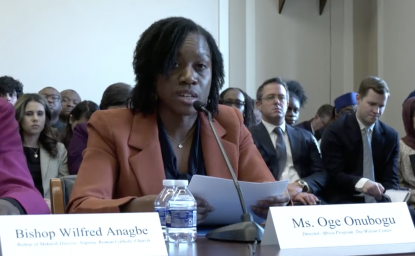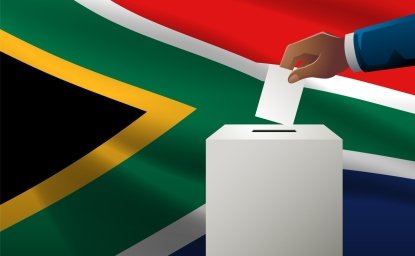Having just returned from a two-week, five nation tour of Africa, the Honorable William J. Clinton, 42nd president of the United States, visited the Wilson Center and addressed an October 9 Director's Forum in the Ronald Reagan Building's ampitheatre to describe his impressions of the people and places he visited. During his two week visit, President Clinton visited Mozambique, Rwanda, Ghana, Nigeria, and South Africa.
Given his stated interest in economically empowering poor communities around the world, Clinton visited Africa to continue his work to promote HIV/AIDS treatment and prevention, democratization, and economic development. Other areas he has actively pursued since leaving office that were among the themes promoted on his Africa trip included racial and ethnic reconciliation; citizen participation; and education.
Ghana
Clinton teamed up with Peruvian economist Hernando De Soto to help implement De Soto's initiative to grant title to the poor, so that Africans can use their farms, homes, and businesses as collateral for credit. In all of Africa, much of the land is held in common and controlled by tribal chieftains.
Nigeria
Clinton met with hundreds of political and educational leaders, discussing ways to modernize their government and fight against HIV/AIDS.
Rwanda and Mozambique
He visited AIDS clinics, discussed economic issues. He noted that Mozambique, before the devastating floods, had ranked among the top five countries in the world for economic growth for three consecutive years. In Rwanda, Clinton visited the genocide memorial. In a small village, he met a Tutsi woman who lost her husband and son in the genocide and a Hutu woman whose husband was charged with participating in the genocide. Both of them, he said, are working toward reconciliation and integration. He said that the hindrance has been politicians seeking aggrandizement and power, rather than with various groups divided by ethnicity.
South Africa
He met with a group called Young Life, comprising young people dedicated to working to prevent the spread of HIV/AIDS. He met with Nelson Mandela to discuss advancing citizen participation. Already advancing the cause, South Africa will have the first foreign branch of Clinton's signature Americorps program and Clinton participated in a televised town hall meeting to discuss and publicize the program.
Africa and the World
Clinton outlined some sobering statistics. He said, 300 million Africans live on under a dollar a day; the life expectancy is 48 years and dropping due to HIV/AIDS; a third of Africa's children are malnourished and nearly half are out of school; and 28 million Africans are living with HIV/AIDS. He said that the rest of the world tends to view Africa as a country not a continent with varied conditions across country lines. But, he said, more world leaders are paying attention to Africa and realizing its importance. While in office, Clinton's administration worked to expand trade, relieve debt, train peacekeepers, increase AIDS assistance, and help end Africa's wars. He said, "I have no doubt that we did make some [mistakes], but at least we showed up in Africa, something America had not been doing on a consistent basis, ever."
"Especially for the United States, if we want the world I believe we do—one defined by economic opportunity not division, inequality and poverty; one in which our security is not threatened by the spread of violent conflict and in which terrorists and criminals have no place to hide; one where disputes are resolved by force of arguments not force of arms—Africa has to be a part of it."
He noted that African nations have taken on a collective responsibility toward improving their governments, curbing corruption, and eliminating human rights abuses, creating the necessary environment to then solicit practical assistance from the developed world. This effort—NEPAD (New Partnership for Africa's Development) developed by South Africa's President Mbeke, was touted by Clinton as Africa's "first homegrown economic plan." He added, "It's the best chance for Africa because they ask of themselves before asking anything of us."
HIV/AIDS
Clinton cited the following:
- Uganda and Senegal have dramatically decreased their HIV/AIDS rate based on prevention. Uganda had the highest rate of infection 10 years ago and managed to cut that rate in half in the last five years.
- Botswana, the richest country in Sub-Saharan Africa, has the highest infection rate: 35 percent of the population is HIV-positive. Companies in Botswana are hiring two people for the same job anticipating that one will die soon while many farmers are too weak to farm their land due to HIV.
- African countries have lost 25 million people to AIDS and if the trend continues, another 65 million will die over the next 18 years and in that period, 100 million will have contracted HIV.
Recommendations
- Improve the health care infrastructure of African nations; heighten the search for an AIDS vaccine.
He urged that there be a balance between treatment and prevention, cautioning against spending all resources on prevention. He said that young people will not even undergo testing or change their behavior if the threat of positive testing is a death sentence. "Medicine gets people to the lab to be tested." The hope of treatment and available medicine is imperative so that people will want to be tested and helped. The alternative is a never-ending vicious cycle of infection and death.
Clinton said he proposed, during his last year in office, a tax credit to drug companies to encourage drug companies to develop a vaccine. "Rich countries have the resources and drug companies to develop it."
- Renew debt relief.
During his years in office, debt relief reached 25 countries and soon it will reach 32, mostly in Africa. The program stipulates that these countries spend the money on education, health care, and economic development. A recent study, he said, showed that education and health spending increased and is saving lives in 10 African countries receiving the assistance. He urged that future rounds of debt relief incorporate all countries afflicted with high HIV rates and that the funds go directly toward health care infrastructure.
- Better coordinate foreign aid.
Africa's share of world trade is only 1.2 percent, said Clinton. He had signed the African Growth and Opportunity Act that significantly increased Africa's exports and generated $8 billion in trade income across the continent. He noted that the bill expires in 2008 and urged its renewal. "We must help them develop the ability to compete."
- Support education.
More than 130 million African children are not in school, but incentives can reverse that trend. He said that each year of schooling for a child in a developing country significantly increases his or her future annual income while freeing up jobs for the parents.
- Support democracy.
Support not just elections, but infrastructure. He underscored the important role that foundations and the private sector can play.




